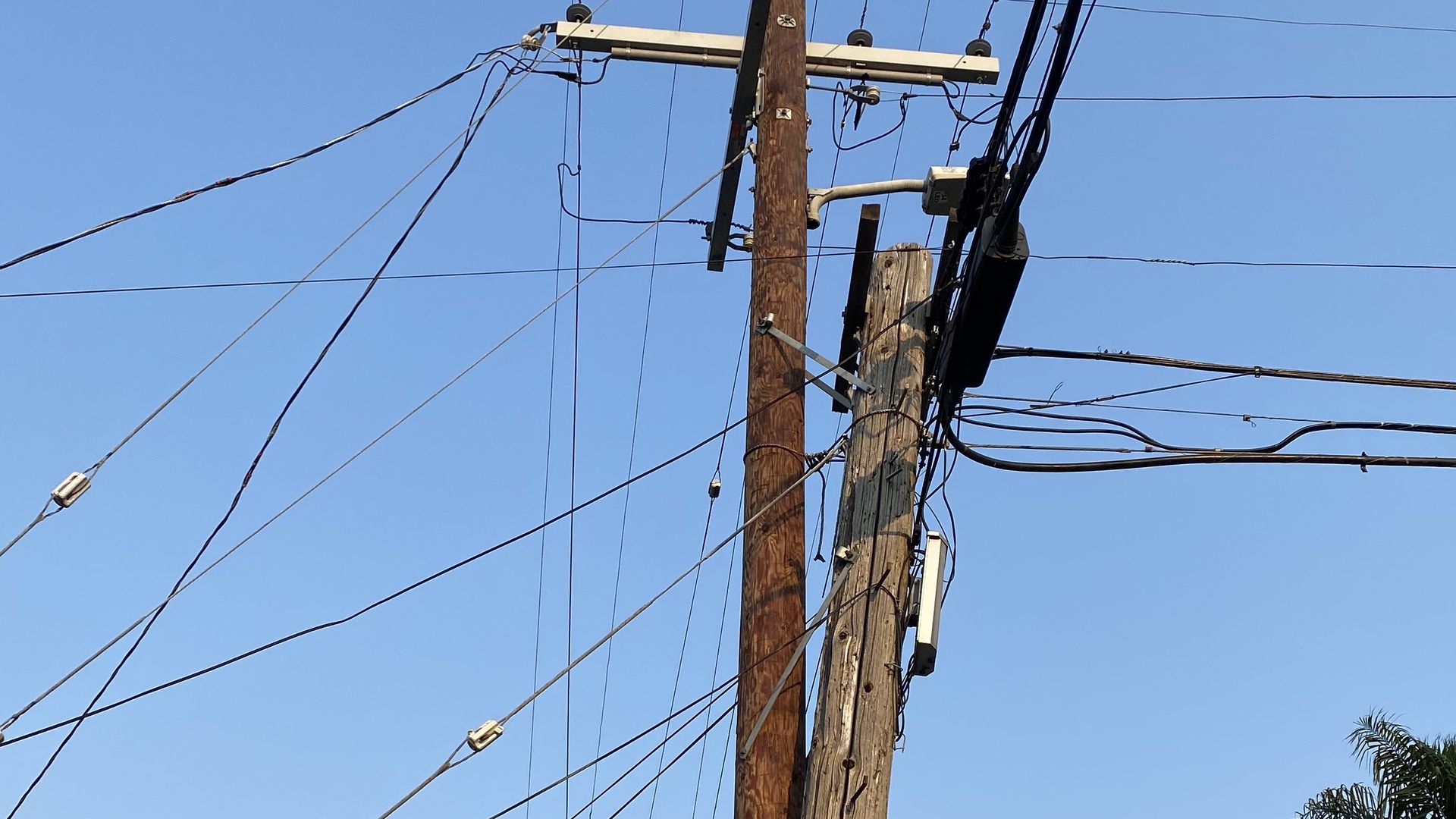| | | | | | | Presented By Walmart | | | | Axios What's Next | | By Jennifer A. Kingson, Joann Muller and Erica Pandey ·Sep 01, 2021 | | Is college worth it? As Erica Pandey describes below, more students are saying "no" — and still getting high-paying jobs. - Today is Day 2 of the Axios editors' takeover of the reader-photo-of-the-day contest — see below for managing editor Scott Rosenberg's contribution.
- Tomorrow: Back to our trusty reader photos. To be considered, please send us a picture you took that says something about how we live, work, play or get around — and tell us why you think it fits our "What's Next" theme. Email: whatsnext@axios.com.
Today's Smart Brevity count: 1,079 words ... 4 minutes. | | | | | | 1 big thing: Students skip college |  | | | Illustration: Sarah Grillo/Axios | | | | As more and more employers nix college degrees as a hiring requirement, students are choosing cheaper, faster alternatives to college like coding boot camps, Erica writes. Why it matters: The cost of college keeps climbing, and federal student loan debt sits at a whopping $1.6 trillion. Students are debating whether college is worth it — especially when it may no longer be necessary to get a high-paying job. What's happening: College enrollment was down about 5% this spring compared with the spring of 2020, according to the National Student Clearinghouse. That's nearly 730,000 fewer students. - The pandemic is contributing to the drop as students choose to delay college either because they can't afford it or because they don't want to attend remote classes. But universities were hurting before the pandemic and will keep struggling after it, says Ryan Craig, managing director of University Ventures, a venture capital firm focused on the future of higher education.
- "The underlying crises of affordability, completion and employability continue unabated," he says.
- So for many students, training programs or boot camps that can teach technical skills in a matter of months can be a smarter bet than a traditional college or university.
At the same time, a number of large employers — including Google, Bank of America, EY, Apple, IBM and Penguin Random House — no longer require college degrees. - Training programs are especially effective when getting jobs in software, IT and health care, Craig says. And interest in these programs has been surging during the pandemic.
- "A lot of companies are realizing that you don't need a more traditional college education to be a good software engineer," says Kate Lillemoen, who dropped out of college and enrolled in a coding boot camp with TechElevator. "It's changing very quickly." She now has a software job.
But, but, but: There are still millions of jobs that do require college degrees, and even for the jobs that don't, there is still a hiring bias that favors degree-holders. - On top of that, there are not nearly enough training programs to prepare America's workforce for the jobs of the future, says James Rhyu, CEO of Stride Inc., an education company.
The bottom line: "We need a cultural shift," Rhyu says. "We have generations and generations of parents that are just conditioned that their kid should go to college. But our country's mantra should be, 'No college required.''' Share this story |     | | | | | | 2. Car owners' new gripe: lousy wireless service |  | | | Illustration: Shoshana Gordon/Axios | | | | The biggest frustration among new car owners is that they can't get their car and their smartphone to talk to one another, Joann Muller writes from a new J.D. Power study. Why it matters: Consumers want their digital lives to follow them seamlessly in the car, which is why Apple CarPlay and Android Auto have become so popular. But if the wireless connection is glitchy, such features don't work, leaving car owners unhappy. - "Owners are caught in the middle when vehicle and phone technologies don't properly connect," said Dave Sargent, vice president of automotive quality at J.D. Power.
Driving the news: One in four problems cited by car buyers in the first 90 days of ownership involves infotainment, according to the J.D. Power 2021 Initial Quality Study (IQS), released Tuesday. - For the first time in a decade, voice recognition is not the top problem; instead, it's Apple CarPlay/Android Auto connectivity, which worsened significantly, especially for those trying to connect wirelessly.
- About one-third of new cars now come with a built-in WiFi hub, which may or may not be compatible with your phone's operating system.
It's not just a case of user error, Sargent adds. - It's a lack of software coordination among automakers and the tech giants, who are often at odds over controlling the in-car experience (and the valuable data at stake).
Read the full story |     | | | | | | 3. A different kind of war video game |  | | | Screenshot: Brave Lamb Studios | | | | The upcoming video game "War Hospital" is the rare historical war game focused on saving lives, not taking them, writes Stephen Totilo of Axios Gaming. Why it matters: War video games are common and cliche. Not this one. The details: Brave Lamb Studios' "War Hospital" is a World War I medical simulation game set in and around a ruined town in France throughout the year 1917. - Players assume the role of a British commander named Henry Wells who runs a field hospital set up in the town's half-destroyed church, just yards from trenches where Allied troops fight German forces.
- The heart of "War Hospital" involves doctors, nurses and wounded soldiers and the morally gray choices involved in the care for people during wartime.
One tricky choice presented during Axios' virtual demo with the Warsaw-based studio involved deciding which of two injured soldiers the base's lone doctor would help. - A developer showing the game tried to heal both.
- But he didn't have enough resources to spend on two thorough surgeries and had to resort to a cheaper amputation for one. An added life saved, though one fewer fighter available.
- The dual operations exhausted the doctor, leaving him more prone to mistakes in future operations.
The big picture: Popular war games like "Call of Duty" tend to treat war more as a playground, with a focus on the game-ified fun of combat, not the trauma of true conflict. What's next: "War Hospital" is scheduled to be released in December 2022 for PC and consoles. Read the full article |     | | | | | | A message from Walmart | | Walmart commits nearly $1B in career training for associates | | |  | | | | This summer Walmart announced it will pay 100% of college tuition and books for associates as part of a five year, nearly $1B investment in career-driven training and development. The goal: Eliminate the burden of education debt for nearly 1.5 million eligible U.S. associates. | | | | | | 4. Flapper dresses are back! |  | | | Lisa Hochstein, formerly of "The Real Housewives of Miami," attends a red-carpet event in that city in July. Photo: Romain Maurice/Getty Images for Mr. Hospitality | | | | Wondering what to wear to that upcoming charity ball or Gatsby-themed cocktail party? (Assuming they aren't called off for COVID-19...) Driving the news: As the Wall Street Journal reports, "flapper style" is chic again. "Outfits inspired by the Roaring '20s are surging back into popularity as history repeats itself," the paper says. What they're saying: "With the vaccines making Covid somewhat more manageable (at least at the time the fall 2021 collections were conceived) and the strong appeal of a centennial tie-in, designers have revived the 1920s party dress," per the WSJ. What we're seeing: An online search for flapper dresses brings up results from Bloomingdale's, Neiman Marcus and Rent the Runway. |     | | | | | | 5. Photo of the day |  | | | Photo: Scott Rosenberg | | | | What's Next: Kludge! Axios managing editor for technology Scott Rosenberg writes: "When the utility company replaced an old telephone pole on my Berkeley, California, block, rather than move all the data wires and hardware to the new pole, they just cut out the relevant chunk of the old pole and hung it from the new one. "It makes an odd though unwitting metaphor for how new urban systems never fully replace old ones." (Definition of "kludge" per Merriam Webster: "A haphazard or makeshift solution to a problem.") |     | | | | | | A message from Walmart | | Walmart to pay for associates' college tuition | | |  | | | | Walmart, the nation's largest private employer, announced it will pay 100% of eligible employees' college tuition as part of a $1 billion, five-year investment in career-driven training. The goal: Create opportunity for associates to grow their careers at Walmart and beyond. | | | | Thanks for reading! Please send photos, comments and suggestions to whatsnext@axios.com. And tell your friends to sign up for What's Next! Subscribe here. |  | | It'll help you deliver employee communications more effectively. | | | | | | Axios thanks our partners for supporting our newsletters. If you're interested in advertising, learn more here.
Sponsorship has no influence on editorial content. Axios, 3100 Clarendon Blvd, Suite 1300, Arlington VA 22201 | | | You received this email because you signed up for newsletters from Axios.
Change your preferences or unsubscribe here. | | | Was this email forwarded to you?
Sign up now to get Axios in your inbox. | | | | Follow Axios on social media:    | | | | | |









No comments:
Post a Comment